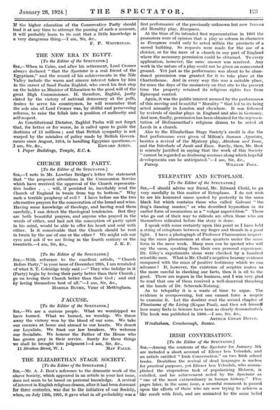THE ELIZABETHAN STAGE SOCIETY.
[To the Editor of the SPECTATOR.]
SIR,—Mr. A. J. Best's reference to the dramatic work of the above Society, which appeared in an article in your last issue, does not seem to be based on personal knowledge: A revival of interest in English religious drama, after it had been dormant
for three centuries, was due to the initiative of our Society, ,when, on July 13th, 1901, it gave what in all probability was a first performance of the previously unknown but now famous old Morality play, Everyman.
At the time of its intended first representation in 1901 the promoters were of opinion that a play so solemn in character as Everyman could only be acted within the precincts of a sacred building. So requests were made for the use of a cloister, or for the nave of a church in any part of England where the necessary permission could be obtained. To every application, however, the same answer was received. Any work in the nature of a play could not be given on consecrated ground. Yet just as the performance was about to be aban- doned permission vas granted for it to take place at the Charterhouse. And in every way this was a suitable place, for since the days of the monastery on that site to the present time the property retained its religious rights free from Episcopal control.
Again, it was the public interest aroused by the performance of this moving and beautiful " Morality " that led to its being acted annually in London and elsewhere. It was followed by revivals of similar plays in England and also in Germany. And now, finally, permission has been obtained for the represen- tation of Hofmannsthal's religious drama to be acted at Leeds in a church. .
Also to the Elizabethan Stage Society's credit is due the first performance ever given of Milton's Samson A gonistes, besides a revival of the Mystery play, Abraham and Isaac, and the Interlude of Jacob and Esau. Surely, then, Mr. Best is scarcely justified in saying that the work of this Society " cannot be regarded as disclosing avenues along which hopeful developments can be anticipated."—I am, Sir, &c.,


































 Previous page
Previous page